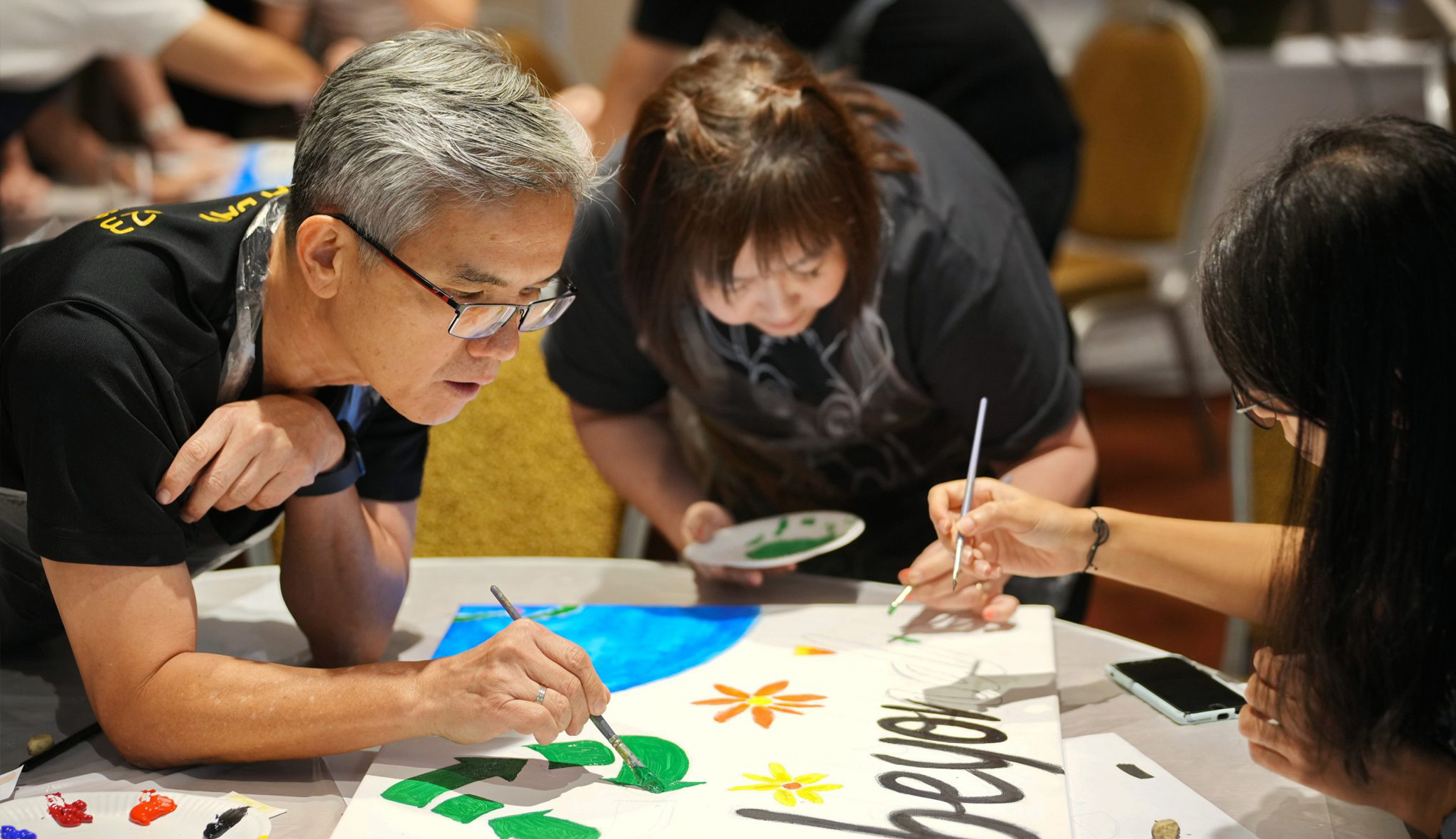Acrylic Painting on Canvas Team Bonding Art Jamming Singapore Visual Arts Centre
























新加坡专业素描课
3.学习基本线条和形状: 熟悉使用铅笔或者炭笔画出直线、曲线、圆形、椭圆等基本形状。
4.学习观察与感知:学习 素描首先要学习观察要画的物体,将所观察到的形状、线条、阴影等转化为画面上的表现。
5.学习轮廓线: 学习如何捕捉物体的轮廓线,这是素描中最基本的步骤之一。练习用轻柔的笔触勾勒出物体的外形。
6.学习阴影和光影: 了解光源对物体产生的影响,学习素描黑白灰三大面、五大调素描元素 如何使用阴影和光影来增加画面的立体感,学习素描笔触来刻画物体质感
7.学习透视: 透视是素描中的重要概念,它能够帮助你在画面中正确表现物体的远近和大小关系。了解一些基本的透视原理和技巧会对你的素描技能有很大帮助。
能力。





新加坡视觉艺术中心开办的专业素描课程适合成人及青少年学习,适合零基础参加学习,视觉艺术中心8位指导教师皆是艺术美院专业科班出身,具有多年教学经验,根据学生绘画程度量身定制个性化课程,让零基础和不同绘画程度的学生在原有的程度上迅速提升。
课程内容:静物临摹、静物写生;风景速写、风景素描写生;石膏几何体写生;石膏头像写生;人物五官素描临摹、人物肖像临摹、人物肖像写生;人体动态速写、人体素描写生;
快来加入专业素描训练,为日后你的绘画之路打下扎实的基础。
欢迎小朋友加入视觉艺术中心专业DSA美术作品集培训课程。如有任何询问,请联系我们,



|
||||||||||||||||||||||||||||||||||||||||||
|
||||||||||||||||||||||||||||||||||||||||||||||||||||||||||||||||||||||


SAT |
10:30am - 12:45pm1pm - 3pm
|
SAT |
|
10:30am - 12:45pm1pm - 3pm
|
|




Address:
10 Penang Road, #01-02 Dhoby Ghaut Green,
Singapore 238469
Exit from Dhoby Ghaut MRT Station Exit B and turn left, we are there in 30m!

Address:
AZ@Paya Lebar, 140 Paya Lebar Road, #03-04,
Singapore 409105
Exit from Macpherson MRT Station Exit A and turn left, we are right across the road, 1 minute walk away!
Have any questions? Please drop us an enquiry form and we'll respond to you as soon as we can!
"*" indicates required fields

10 Penang Road,
#01-02 Dhoby Ghaut Green,
Singapore 238469
140 Paya Lebar Road,
#03-04 AZ@Paya Lebar Building,
Singapore 409015
6255 0711
info@visualartscentre.sg
62550711
67332155
Dhoby Ghaut Art Studio
Monday to Sunday: 11am – 8pm
Closed on Public Holidays, except by appointment.
MacPherson [Office & Storage]
By appointment only
Visual Arts Centre is an exhibition gallery and art studio at Dhoby Ghaut Green supported by the National Parks Board and the National Arts Council.
Since its initiation on 31 January 2016, the Visual Arts Centre Exhibition Gallery has hosted over two hundred international and local art and design exhibitions, boasting a diverse range of art styles and programmes.
Email:
info@visualartscentre.sg
Phone:
+65 6255 0711
+65 6733 2155
Featured Courses 推荐课程
Art Immersion 3 Medium Course 综合媒介绘画课
Drawing & Sketching Course 素描课程
Acrylic Painting Course 丙烯画课程
Watercolour Painting Course 水彩画课程
Oil Painting Course 油画课程
Chinese Ink Painting Course
Trial Sessions 试课
Chinese Calligraphy & Ink Painting
Graffiti Spray Painting Course
Portfolio Preparation Course (Process) 作品集 (DSA)
Portfolio Preparation Course (Process) 作品集 (Diploma)
Professional Manga Drawing & Digital Painting Course
Professional Interior Design & Freehand Rendering Course
Outdoor Urban Landscape Sketching Course
Private Art Classes
Creative Kids Art Immersion Course 儿童创意绘画课程
Holiday Art Courses & Bootcamps
2025: Holiday Art Course for Kids & Teens 儿童和青年假期课程
2025 Kids (6-9YO) Holiday Art Course 儿童假期课程
2025 Teens (10-18YO) Holiday Art Course 青年假期课程
Team Building Art Jamming
Art Jamming Team Bonding Catalogue
Team Bonding
Gala Dinner Art Workshop
Batik Painting Workshop (Mural / Individual)
Graffiti Spray Painting on Canvas Workshop
Kids Birthday Party - Art Jamming
Kids T-Shirt Painting Art Party
Batik Painting Workshop
Graffiti Spray and Paint Workshop
Therapeutic Mental Health Workshops
Art Workshop
Workshops at SAM During SAW 2025
Digital Dreams - Transforming Ideas Into Art
Nude Life Drawing with Artist Guidance
Portrait Life Drawing with Artist Guidance
Chinese Ink Painting
Chinese Calligraphy & Ink Painting
Current & Upcoming Exhibitions
Venue Hire 场地出租
Hire of Visual Arts Centre Exhibition Gallery @ Dhoby Ghaut
Visual Arts Centre Exhibition Gallery @ Dhoby Ghaut
Visual Arts Centre Gallery and Studio @ MacPherson
Special Art Jamming Themes
Chinese New Year Art Jamming
Art Workshops for Singles and Dating
Women's Day
Labour's Day
National Day
Mid Autumn Festival
Deepavali Art Jamming
Halloween Art Jamming
Christmas Art Jamming
View More
Best Team Building Activity
Art Jamming Team Bonding Catalogue
零基础自助绘画(Art Jamming )工作坊
Kids Art Jamming Birthday Party Workshops
艺术生日派对-DIY粘土主题
Art Birthday Party With Diy Clay
Art Birthday Party With Tote Bag Painting 艺术生日派对-画托特包主题
Birthday Party With T-shirt Painting
艺术生日派对-画T恤衫主题
Art Competition and Affordable Art Fair Workshops
(Embracing Nature) Children and Youth Art Competition
Workshops & Fair Activities
Venue Hire
10 tips for a successful pop-up flea market event
Beautiful Space in the City Central
A Perfect Art Venue for Hire
What to consider when renting a venue for your fashion shows and pop-ups?
Art Course
Where to learn Professional Chinese calligraphy course in Singapore?
艺术疗愈如何让你心理更健康
Best Professional Art Courses In Singapore
在新加坡哪里能学专业素描/速写、油画、水彩、丙烯、水墨、艺术作品集准备、儿童美术、儿童青少年书法等专业美术绘画课?
在新加坡哪里学习专业书法课程?学习书法对儿童青少年的好处
View More
Art Portfolio Preparation - DSA (Kids)
凭什么,新加坡乌节路寸土寸金的商业宝地竟给国人当画室? 快!带你去看看!
Singapore Holiday 2025 - Learn Digital Landscape Painting and Manga Drawing
成人画画课就在视觉艺术中心
Applying into Art Schools - How does one build an art portfolio?
Others
Best Professional Manga Drawing Drawing Course in Singapore
对南洋画派新加坡第一代艺术先驱作品的印象
定制贵宾晚宴的艺术项目
Art Buzz: How to Appreciate Art?
《纪念刘抗诞辰111周年—刘抗书画遗作展》
10 Reasons to Learn Drawing and Sketching
View More
Art Therapy Course in Singapore!
Overseas Students Art & Cultural Exchange
Commissioning Custom made portraits/nude life by professional artists
FAQs for Art Portfolio Preparation - DSA, Diploma & Higher Education
Click and get to our WhatsApp
In the Batik Introduction Handkerchief Painting workshop, participants will learn the traditional art of batik, a wax-resist dyeing technique originating from Indonesia. The workshop begins with a brief history and overview of batik, highlighting its cultural significance and various techniques. Participants will then observe a demonstration of applying wax with tjanting tools and dyeing the fabric. Following the demonstration, each participant will design and create their own batik handkerchief, applying wax to create patterns and then dyeing their fabric. The workshop concludes with a group discussion, allowing participants to share their creations and reflect on their learning experience.